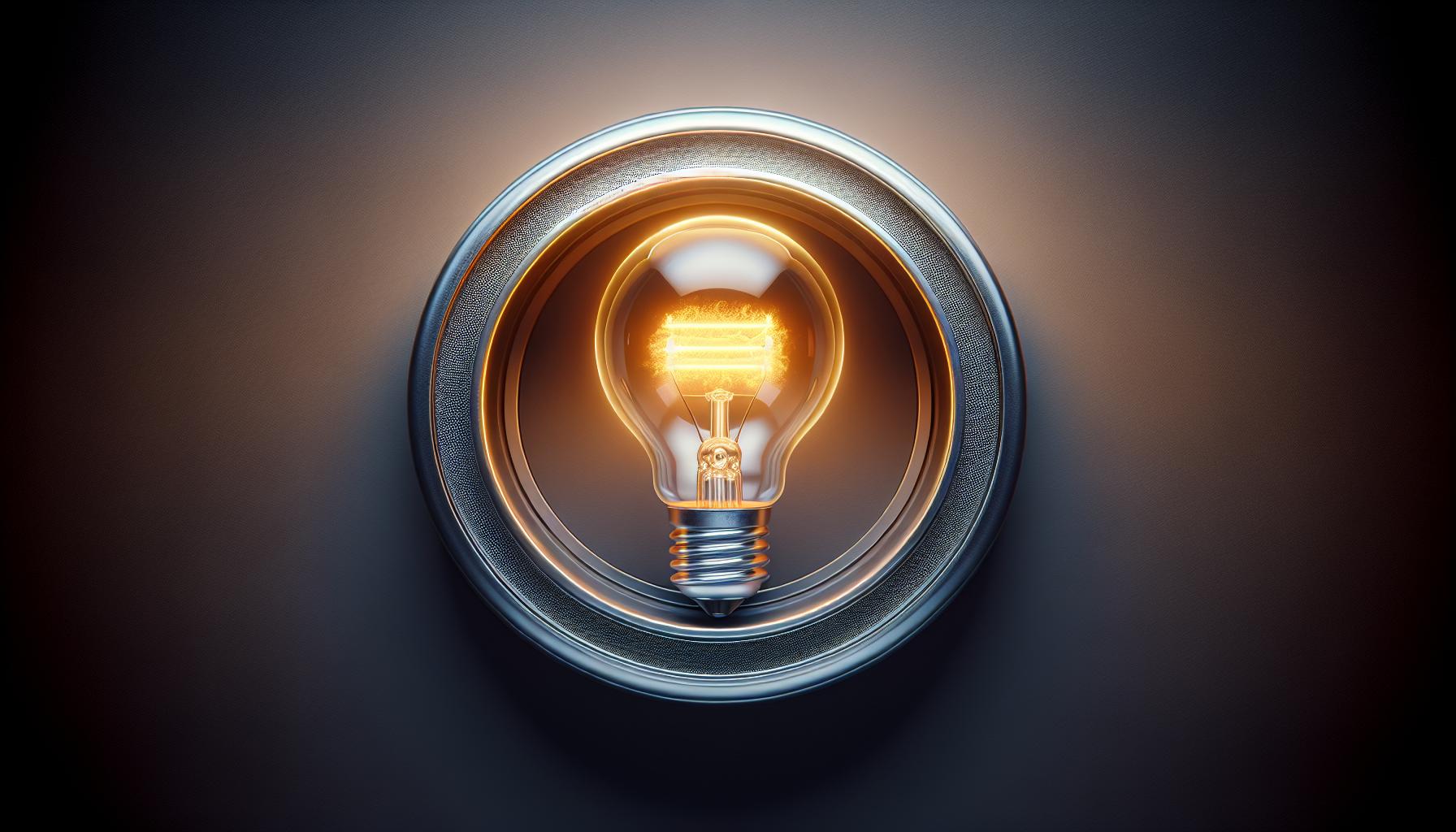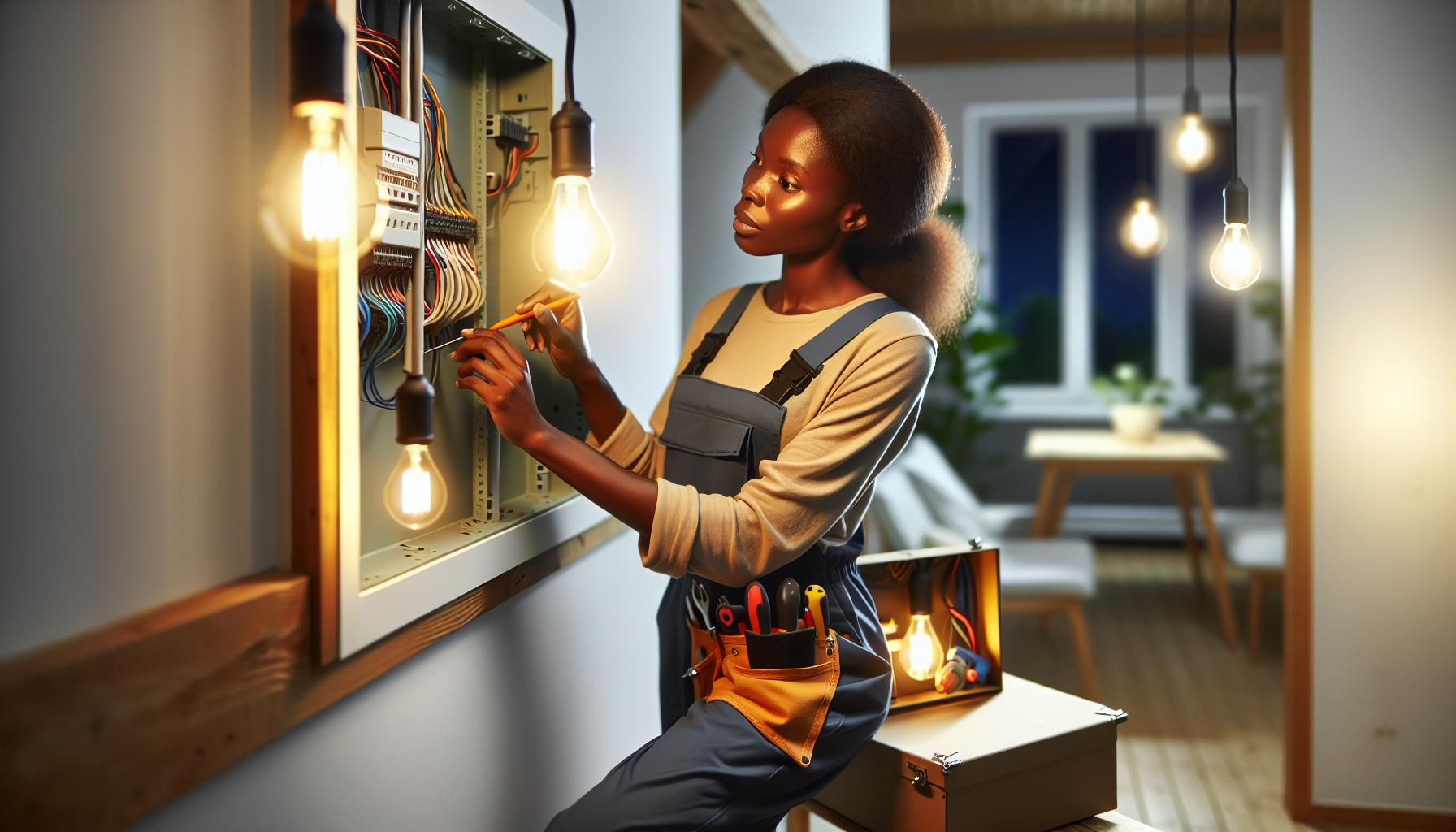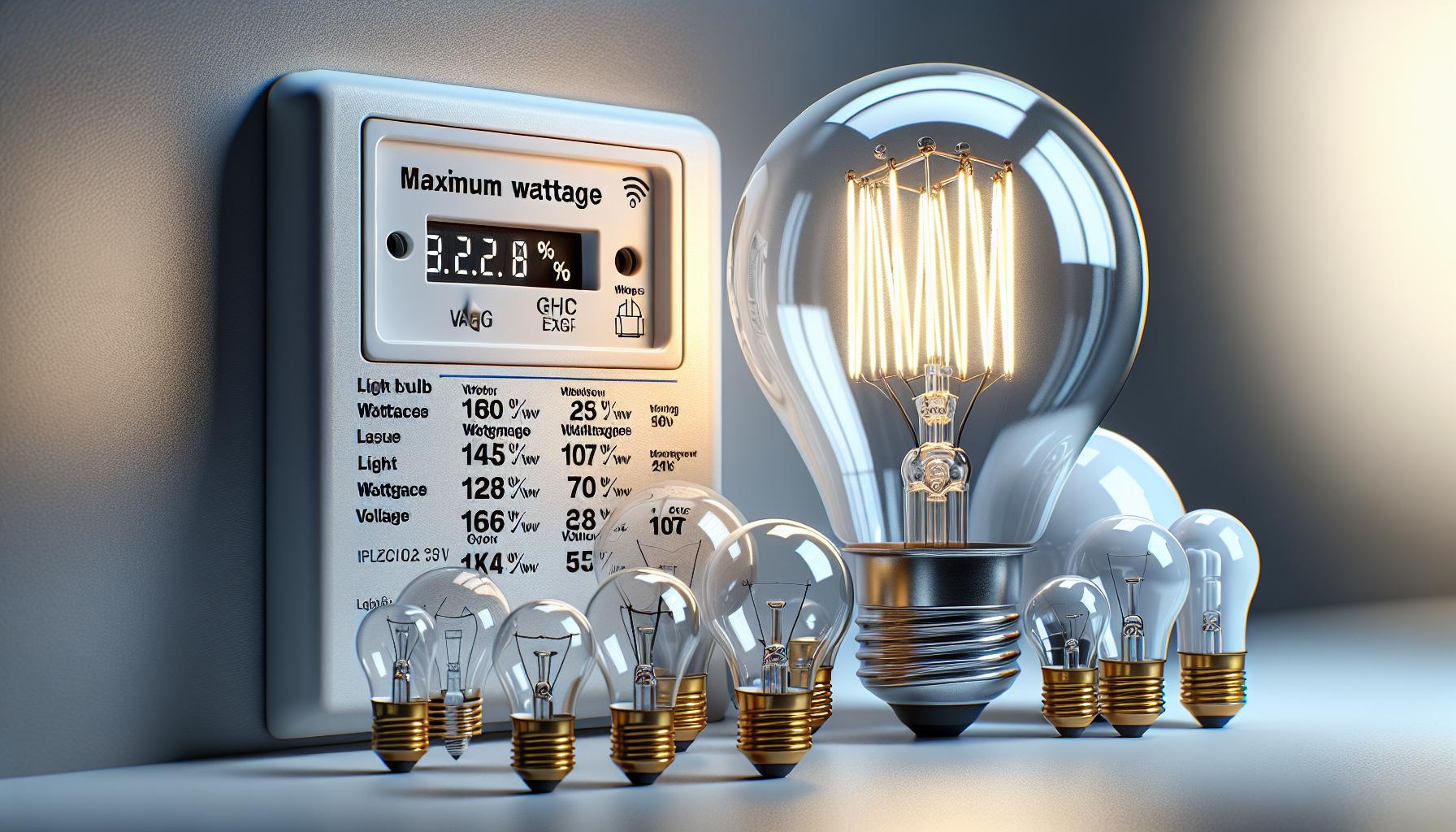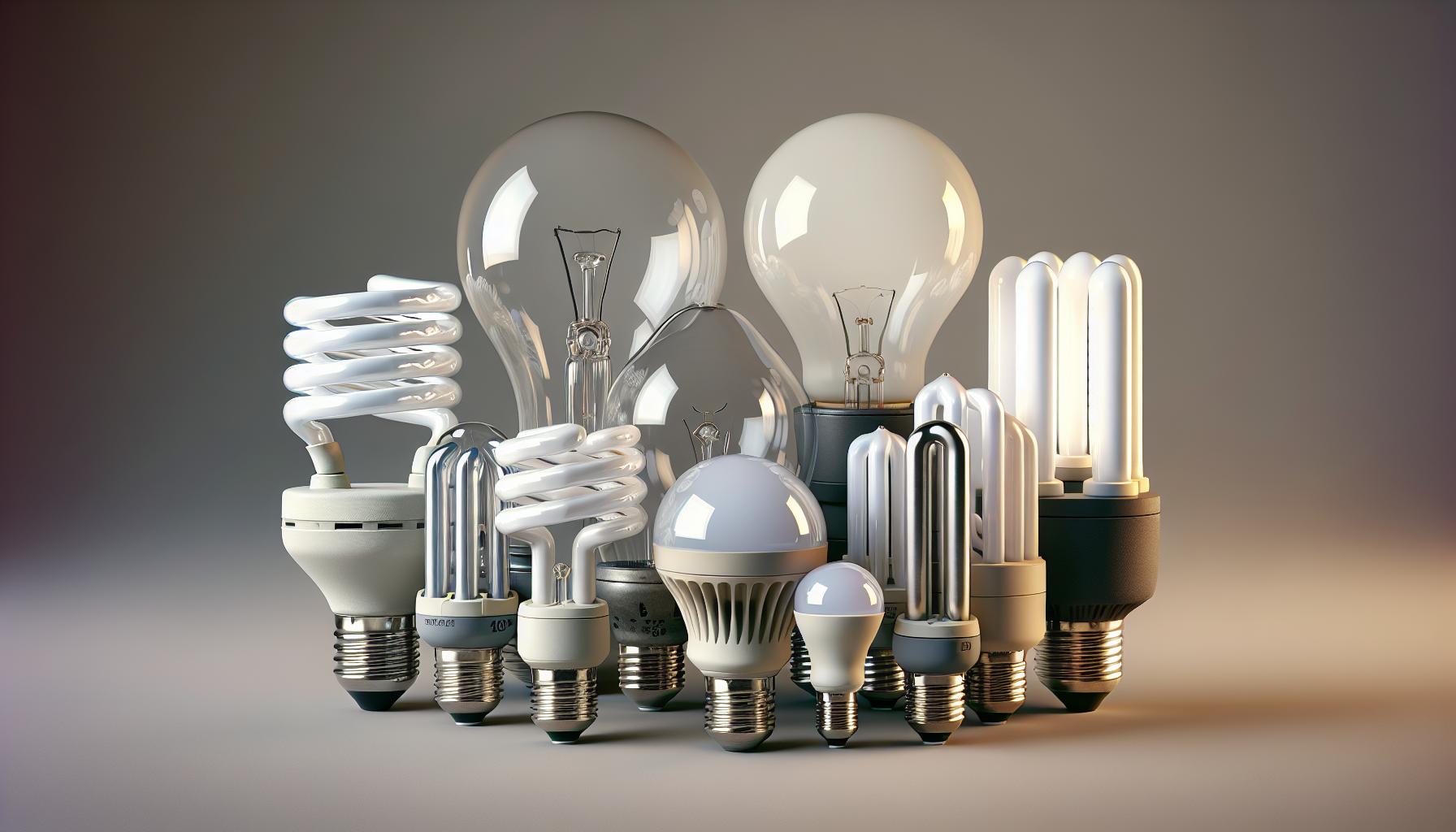Ever been jolted by the sharp pop of a light bulb going out? It’s a common household occurrence that can startle anyone. But what exactly causes that tiny explosion above your head?
Understanding why light bulbs pop could save you from unexpected darkness and the mini heart attack that follows. It’s not just about the inconvenience; it’s about knowing your home better.
Causes of Light Bulbs Popping
When you’re cozied up with a good book or neck-deep in a DIY project, the last thing you want is the startling pop of a light bulb going rogue. Let’s shine a light on the common culprits behind these untimely outages.
High Voltage Surges are notorious for sending bulbs to an early grave. Your home’s electricity should flow like a calm river, but when it turns into a torrential surge, even the best bulbs can’t withstand the pressure.
- Defective Bulb Construction: Sometimes the bulb itself is flawed. Manufacturing defects like thin glass or improper filament support can turn bulbs into mini glass grenades.
Poor Installation can also lead to bulb blowouts. If a bulb isn’t screwed in just right – not too tight, not too loose – its connection to the power source might cause it to overheat, much like a nervous speaker flubbing lines on stage.
- Incorrect Wattage: The bulb’s wattage must match your fixture’s rating. Jamming a 100-watt bulb into a 60-watt socket is like trying to fit a square peg into a round hole – it simply won’t end well.
Excess Moisture often spells doom for outdoor or bathroom fixtures. When hot glass meets cold water, the rapid temperature change can lead to a shattered bulb.
| Cause | Effect |
|---|---|
| High Voltage Surges | Early Failure |
| Defective Construction | Breakage & Explosions |
| Poor Installation | Overheating & Popping |
| Incorrect Wattage | Overloading & Burning |
| Excess Moisture | Shattering |
Remember, bulbs are like the unsung heroes of your home – in the limelight yet seldom heralded until they’re gone. Armed with this illuminating intel, the next time a light bulb pops, you’ll know exactly which suspect to interrogate. Keep your lighting in tip-top shape, and you’ll rarely be left in the dark.
Overheating as a Common Cause
When you’re tackling your latest DIY project, the last thing you need is a light bulb that can’t stand the heat. Overheating is a notorious culprit for popped light bulbs, and understanding it can save you from a sudden plunge into darkness. Excessive heat can build up in several ways, often related to the design of the lamp or fixture itself.
Enclosed Fixtures and Poor Ventilation
If you’ve ever touched a light bulb that’s been on for a while, you know they get hot. Now imagine that heat trapped inside an enclosed fixture with poor ventilation. It’s like wearing a winter coat in summer; the bulb simply overheats. This is a common scenario in stylish, modern fixtures that prioritize form over function, leading to a shorter bulb lifespan.
High Wattage Bulbs in Low Wattage Fixtures
You might feel the urge to put a high wattage bulb in a low wattage fixture for that extra brightness. While it might seem like a bright idea, it’s a fast track to overheating. Fixtures are designed to handle a specific amount of heat, and exceeding this can cause bulbs to pop. Always match the bulb’s wattage with what your fixture allows.
Proximity to Heat Sources
DIY enthusiasts love a well-lit workspace, but positioning a lamp near a heat source, like an oven or heater, can raise the temperature too high for any bulb. Always consider the location of your light fixtures in relation to other heat-producing appliances.
By keeping these factors in mind when choosing and installing light bulbs, you can greatly reduce the risk of overheating. Ensure adequate airflow around bulbs, adhere to wattage recommendations, and position fixtures away from additional heat sources. These simple steps can prolong the life of your bulbs and keep your space illuminated just the way you like it.
Faulty Wiring and Electrical Surges
« Do Light Bulbs Expire if Not Used? Maximize Bulb Lifespan With These Tips
How Long Do Refrigerator Light Bulbs Last? Maximize Their Lifespan with These Tips »
As someone passionate about DIY projects and ensuring your home is well-lit and safe, you should be aware that faulty wiring can be a silent culprit behind light bulbs popping. Wiring that is old or improperly installed can lead to loose connections. When the electrical current isn’t consistent, it can cause your bulbs to flicker and, ultimately, fail prematurely.
- Check for signs of faulty wiring:
- Flickering lights
- Buzzing sounds from fixtures
- Discoloration around switches or outlets
Electrical surges are another beast to tackle. These sudden spikes in power can occur during storms or when high-powered electrical devices are turned on. Your light bulbs, unfortunately, are quite sensitive to these surges. The filaments inside can literally burn out in a flash if the surge is strong enough.
- Protect your bulbs from surges by:
- Installing surge protectors
- Using power strips with built-in surge protection for your lamps
- Upgrading your home’s electrical panel to include surge protection
Remember that the quality of your electrical system is paramount to bulb longevity. Without a stable supply of electricity, even the best bulb won’t stand a chance. So, if you’re dealing with frequent bulb popping, it’s worth having a professional electrician conduct an inspection. They can pinpoint issues like overloaded circuits or aged wiring that not only affect your lighting but could also pose a fire hazard.
Taking the time to address these electrical issues not only helps in preventing the untimely demise of your bulbs but also safeguards your home against potential electrical problems. And while you’re at it, it’s the perfect excuse to upgrade other lighting elements for a fresh new look and enhanced functionality that aligns with your DIY and lighting interests.
Incorrect Wattage and Voltage
Choosing the right wattage for your light fixtures is crucial to prevent light bulbs from popping. You’ve probably seen those labels on lamps or fixtures specifying a maximum wattage, and there’s a good reason why you should heed those warnings. Light bulbs with higher wattage than the fixture’s rating can draw more power, leading to overheating. Overheating is one of the main causes for light bulbs to pop. That’s why it’s always best to match the bulb’s wattage with what your fixture recommends.
Voltage requirements also play a critical role. If a bulb designed for lower voltage is used in a high voltage socket, it can receive an unexpected surge of electricity that can cause it to blow. On the contrary, if a high voltage bulb is placed in a low voltage fixture, it’ll underperform, dim prematurely, or again, potentially pop from the irregular power flow.
Follow these tips to avoid wattage and voltage issues:
- Check the fixture’s maximum wattage before buying bulbs
- Ensure bulbs are suitable for your home’s voltage standard, typically around 120 volts in the US
- Consider using LED bulbs, as they consume less power and produce less heat
Besides preventing popping, the right wattage and voltage also influence a bulb’s longevity and performance. Don’t ignore the labels—those little numbers are the secret to keeping your lights glowing safely and efficiently. Remember, mismatched wattage and voltage not only increase the risk of popping but can also lead to higher energy bills and a shortened lifespan for your bulbs. Safeguard your home lighting by double-checking these details. If in doubt, consulting with a lighting expert or electrician can clear up any confusion and help you make the best choices for your lighting needs.
Bulb Quality and Lifespan
When you’re dealing with light bulbs, quality makes a considerable difference. Not all light bulbs are created equal and the material and manufacturing processes can substantially affect their durability. For instance, bulbs with thinner filaments are more prone to breaking, especially when subjected to power fluctuations or when turned on and off frequently.
In the world of light bulbs, lifespan is often measured in hours of usage. Most incandescent bulbs are expected to last between 750 to 2,000 hours, whereas LED bulbs can last a remarkable 15,000 to 25,000 hours. It’s no wonder that many are switching to LEDs for their longevity. Here’s a quick look at the longevity of different types of bulbs:
| Type of Bulb | Expected Lifespan (hours) |
|---|---|
| Incandescent | 750 – 2,000 |
| Halogen | 2,000 – 4,000 |
| CFL | 8,000 – 15,000 |
| LED | 15,000 – 25,000 |
When DIY enthusiasts like yourself get hands-on with home lighting projects, choosing high-quality bulbs is essential. You should look for reputable brands and models with solid warranties. There’s a direct correlation between the initial investment in a quality bulb and the length of time before you’ll be back on a ladder to replace it.
Moreover, some bulbs come with added features like vibration resistance, which can be particularly beneficial in areas like workshops or garages where they may be subjected to more frequent shocks or movement.
Remember to keep an eye on the age of your bulbs. Just as you track the tire tread on your car, it’s wise to monitor bulb usage, especially for those fixtures used regularly. This proactive approach ensures you replace bulbs before they pop unexpectedly and leaves you in the dark.
Conclusion
You’ve got the scoop on keeping your lights shining bright without the unexpected pop. Remember to match wattage and voltage correctly—your fixtures will thank you for it. Opting for LEDs can be a smart move too, not just for your wallet but for peace of mind. Quality matters, so don’t skimp on the good stuff. Keep an eye on those bulbs and swap them out before they give you a surprise. Here’s to a well-lit, pop-free home!
Frequently Asked Questions
Why do light bulbs pop?
Light bulbs can pop due to incorrect wattage or voltage, overheating, poor quality, or power surges. Using a bulb with a higher wattage than the fixture’s rating or a voltage mismatch can contribute to this issue.
How can I prevent my light bulbs from popping?
To prevent light bulbs from popping, ensure you use bulbs with the correct wattage and voltage for your fixtures. Also, consider LED bulbs that use less power and generate less heat, and choose high-quality bulbs from reputable brands.
Are LED bulbs less likely to pop?
Yes, LED bulbs are less likely to pop because they consume less power and produce less heat compared to traditional incandescent bulbs, reducing the risk of overheating.
What factors affect the lifespan of a light bulb?
Factors that affect the lifespan of a light bulb include filament thickness, quality of manufacturing, power fluctuations, and adherence to voltage and wattage specifications of the light fixture.
How do I choose the right wattage for my light fixture?
Check your light fixture for a label indicating the maximum wattage and choose light bulbs that do not exceed this limit. This will help prevent overheating and prolong the life of your bulbs.





